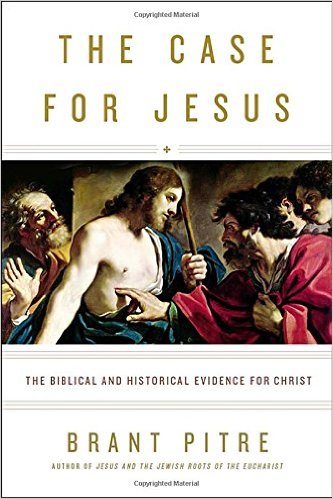 A few pebbles dropped (by Michael Bird, James McGrath, Anthony Le Donne and Brant Pitre) into the pond of bible studies blogs alerting me to a new book by Brant Pitre, Professor of Sacred Scripture at Notre Dame Seminary in New Orleans. Brant Pitre recently joined The Jesus Blog as a regular contributor alongside James Crossley, Anthony Le Donne, Chris Keith, Christine Jacobi and most recently Rafael Rodríguez. The new book is “not written for scholars” (p. 10) but the blurb recommendations do assure us that
A few pebbles dropped (by Michael Bird, James McGrath, Anthony Le Donne and Brant Pitre) into the pond of bible studies blogs alerting me to a new book by Brant Pitre, Professor of Sacred Scripture at Notre Dame Seminary in New Orleans. Brant Pitre recently joined The Jesus Blog as a regular contributor alongside James Crossley, Anthony Le Donne, Chris Keith, Christine Jacobi and most recently Rafael Rodríguez. The new book is “not written for scholars” (p. 10) but the blurb recommendations do assure us that
- it “will benefit both scholars and laymen who read it” (Trent Horn),
- its author “has a unique talent for putting scholarly work of the highest caliber into an accessible and engaging form” (Mary Healy),
- it is the work of “wide-ranging research and careful rethinking” (Craig Keener),
- it is an “important book” written by “one of America’s most brilliant young scholars” (Chris Tilling),
- it’s content is “all supported by top-notch scholarship.” (Nicholas Perrin).
So scholarly book-lover that I am I grabbed a copy and started reading. I could not put it down. I’m normally a slow reader of scholarly books, taking time to check and follow up footnotes, backtracking to be sure I am registering the flow of argument, etc. But I finished The Case for Jesus: The Biblical and Historical Evidence for Christ all within a few hours.
The experience reminded me of delving into books published by my old religious cult many years ago, proving decisively and with impeccable logic and thorough research that the Bible really was the word of God, genuine scholarship proved that fact, and all modern scholarship that cast doubts on this was under the sway of the stubborn minds who refused to read the evidence seriously and foolishly relegated the Gospels to folklore and fairy tales. Form criticism was likened to the folly of that favourite juvenile Telephone Game that only works because the players don’t take the message they are asked to relay seriously and make up any old thing as they pass it along.
Now there’s nothing wrong with having a difference of opinion, or interpretation of the evidence. But a scholar surely has a responsibility to treat lay readers with enough respect to keep them informed of where his or her views sit in relation to those of his or her peers. I once asked a linguist about a particular theory of the nature of language and he began his response with, “Well, it depends who you ask….” He did not give me his own view as if it was “the truth”. He told me a range of views and the basic reasons for each and then gave his own. That’s how a scholar shows a lay person respect.
It’s not like that among some biblical scholars. Some of them, like Brant Pitre, take the opportunity to deliver a propaganda message and try to convert you to their belief system. Along they way they invite you to scoff at other scholars who disagree. They are write dogmatically, fanning dogmatism among readers. Continue reading “Scholars Doing Over Lay Readers with Apologetics”
